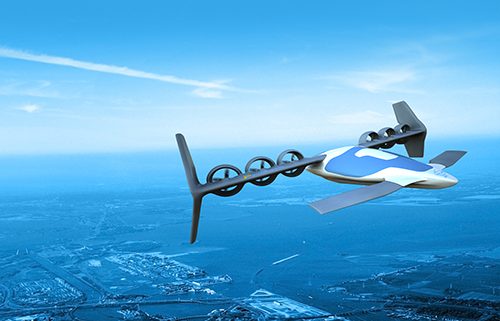NLR and Delft University of Technology have launched a project called NOVAIR (Novel Aircraft Configurations and Scaled Flight Testing Instrumentation) to design aircraft configurations with hybrid propulsion as part of Europe’s Clean Sky 2 joint undertaking. A gas turbine motor will generate electricity to power an aircraft by electric motors. Initial studies indicate that this kind of propulsion combined with a radically new aircraft concept has the potential to reduce fuel consumption by approximately ten percent. The first demonstration model of such an aircraft concept is expected to be tested in 2021. Total EU funding for NOVAIR comes to more than € 5 million, including more than € 3 million reserved for NLR. The project will run for six years.
In the search for ways of reducing air traffic’s adverse impact on the environment, Hybrid Electric Propulsion (HEP) is an intermediate step towards aircraft powered entirely by electricity. The energy density of present batteries is not yet sufficient to allow larger aircraft to fly long distances powered completely by electricity.
There are aerodynamic advantages to a system that uses a gas turbine motor to generate electricity for propulsion in a new aircraft concept. As the propulsion will be detached from a gas turbine motor, it is possible to position the propulsion on the wing or fuselage in a way that improves the aerodynamic properties of an aircraft. A hybrid aircraft configuration will thus make an extra contribution to reducing aircraft fuel consumption and emissions.
Another part of Clean Sky 2 to which NOVAIR is making a contribution is the development of techniques for testing this new aircraft concept by using scale model aircraft. Testing with full-scale aircraft is expensive and risky, while wind tunnel tests are not always sufficient to study all aspects of dynamic aircraft behaviour. A scaled unmanned model makes it possible to test new aircraft configurations inexpensively and risk-free, including aircraft with hybrid propulsion. In the NOVAIR project, NLR is responsible for the instrumentation of scale models. This builds upon the organisation’s own SMARD (Scale Model Aircraft Research & Development) programme in which a scale model is being developed of the Citation, the research plane of NLR and Delft University of Technology.
The NOVAIR project is helping to achieve the Clean Sky 2 objective of reducing air traffic fuel consumption and emissions by thirty percent in 2035. NOVAIR has brought together hybrid electric propulsion and scale model aircraft testing. This puts the Netherlands at the forefront of global research into sustainable aviation.



